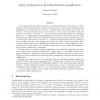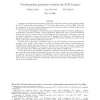8 search results - page 1 / 2 » Hardness Hypotheses, Derandomization, and Circuit Complexity |
FSTTCS
2004
Springer
13 years 10 months ago
2004
Springer
We consider hypotheses about nondeterministic computation that have been studied in different contexts and shown to have interesting consequences: • The measure hypothesis: NP d...
FOCS
1999
IEEE
13 years 9 months ago
1999
IEEE
Various efforts ([?, ?, ?]) have been made in recent years to derandomize probabilistic algorithms using the complexity theoretic assumption that there exists a problem in E = dti...
ECCC
2010
13 years 5 months ago
2010
An errorless circuit for a boolean function is one that outputs the correct answer or "don't know" on each input (and never outputs the wrong answer). The goal of e...
COCO
2008
Springer
13 years 6 months ago
2008
Springer
We prove that the weighted monotone circuit satisfiability problem has no fixed-parameter tractable approximation algorithm with constant or polylogarithmic approximation ratio un...
ECCC
1998
13 years 4 months ago
1998
Impagliazzo and Wigderson IW97] have recently shown that if there exists a decision problem solvable in time 2O(n) and having circuit complexity 2 (n) (for all but nitely many n) ...


